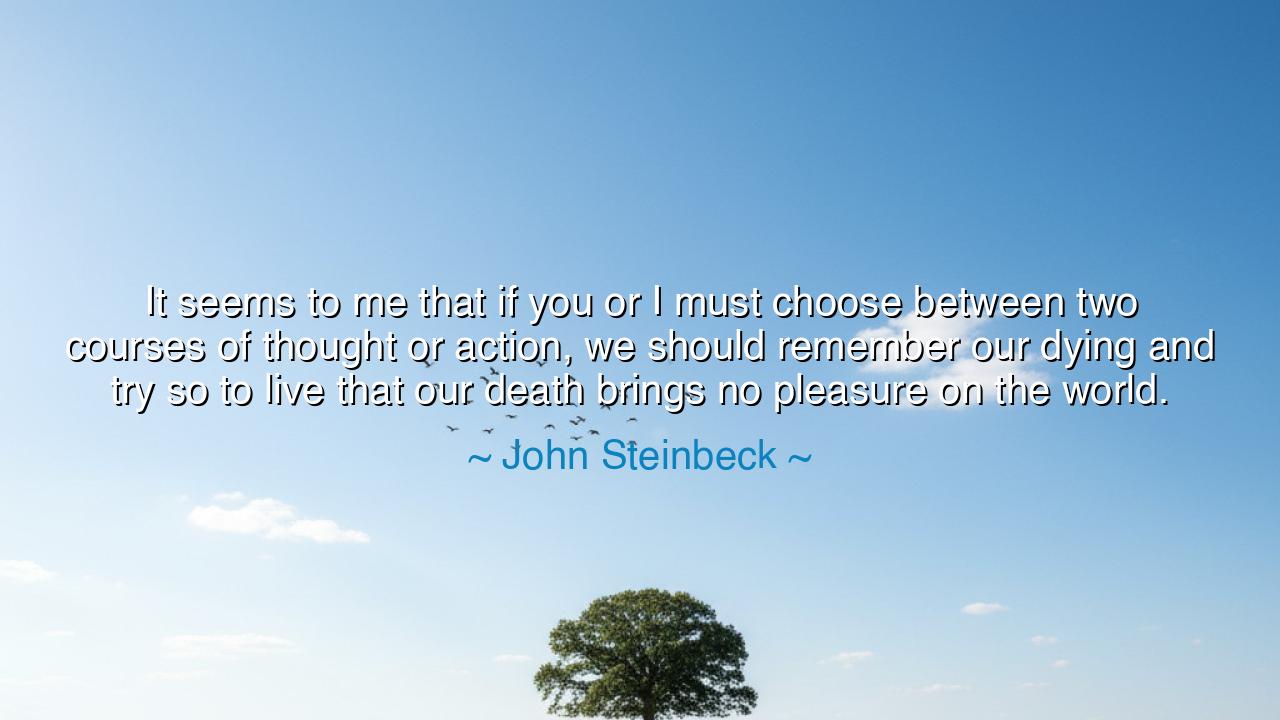
It seems to me that if you or I must choose between two courses
It seems to me that if you or I must choose between two courses of thought or action, we should remember our dying and try so to live that our death brings no pleasure on the world.






In the solemn and timeless words of John Steinbeck, the great chronicler of human struggle and dignity, there resounds a moral compass for all generations: “It seems to me that if you or I must choose between two courses of thought or action, we should remember our dying and try so to live that our death brings no pleasure on the world.” These words, born of quiet reflection, are not meant to frighten us with death, but to awaken us to life — to remind us that the measure of a soul lies not in what it gains, but in what it gives, and in how it leaves the world when it departs from it.
The origin of this quote lies in a letter Steinbeck wrote to his friend Adlai Stevenson, a statesman and moral thinker of his own time. It was a moment of deep moral contemplation, set against the backdrop of the Cold War — an age when power and ideology tempted men to forsake humanity for victory. In these few words, Steinbeck crystallized an ancient truth: that one’s life, when viewed through the lens of mortality, must be a force of goodness, not harm. To live in such a way that no one rejoices at your passing is to live with honor, compassion, and justice.
The idea of “remembering our dying” echoes the wisdom of the ancients — the Stoic philosophers, who taught memento mori, “remember that you must die.” Yet Steinbeck gives this teaching a new, moral urgency. To remember death is not merely to prepare for it, but to shape one’s actions in its light. For death is the mirror that strips away illusion. When we recall that our days are numbered, our greed fades, our pride shrinks, and the heart awakens to kindness. What remains is the eternal question: will the world sigh in sorrow or breathe in relief when we are gone?
Throughout history, this truth has been proven again and again. Consider Marcus Aurelius, emperor and philosopher, who ruled not for personal glory but for the welfare of his people. When he died, even his enemies spoke of his virtue, for he had governed with humility and wisdom. His death brought grief, not triumph, for the world had lost a good man. Contrast this with tyrants, whose passing brings celebration — rulers whose greed and cruelty left scars upon the earth. Their names fade, but their infamy lingers, as a warning that power without compassion leads only to contempt. Steinbeck’s words stand as a shield against such corruption of the soul.
To “live so that our death brings no pleasure” does not demand perfection — it demands conscience. It means to walk through life mindful of the weight of one’s deeds upon others. It means speaking truth when silence would harm, forgiving when hatred would fester, and acting with fairness even when it costs one’s pride. It is not about grandeur or recognition; it is about integrity — the quiet dignity of one who leaves peace in his wake. Such a person does not need monuments or praise, for his memory itself becomes a blessing to those who remain.
Yet Steinbeck’s wisdom also carries an unspoken challenge: to confront the darkness within. For every human heart holds both light and shadow. We must ask ourselves: what in me would cause the world pain if I let it rule? Is it anger, greed, envy, or cruelty? And then, through self-knowledge and love, we must work to overcome it. To live rightly is not to avoid struggle, but to wage that noble war within the self — to bring forth the better nature that lies buried beneath fear and selfishness.
The lesson, then, is this: live with the awareness of your own mortality, but do not let that awareness breed despair. Let it instead give you clarity and purpose. Speak kindly, work justly, love deeply, and act with courage, so that when your final breath leaves you, it carries no bitterness, and your memory gives comfort, not relief, to those who knew you. In this way, your life becomes not a shadow passing through time, but a flame — a light that continues to warm the world even after you are gone.
So remember this, O children of the living earth: live in such a way that death itself bows its head in respect when it comes for you. Let your existence be a source of joy, not sorrow, for those who walk beside you. And when the end comes — as it comes for all — may the world not rejoice at your absence, but weep with gratitude that you were ever here. For that, as John Steinbeck teaches, is the true measure of a life well-lived.






AAdministratorAdministrator
Welcome, honored guests. Please leave a comment, we will respond soon